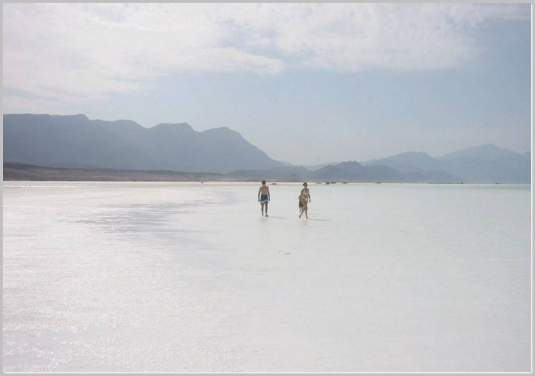
Lake Assal is a crater lake that is located in Djibouti and this is a saline lake that rests below sea level at 509 feet. This lake has no outflow because of high evaporation. Lake Assal is located in the center of the country and is surrounded by hills on the west. It has an oval shape.
This lake has quite a long history and it once contained freshwater. It is believed that it became a saline lake because it was once flooded by the sea. On certain bank shores of the lake, thorny bushes and shrubs grow. The water in this lake is very rich in minerals, but there are no signs of life in the lake. The bacteria population in the lake is quite plentiful.
Near the streams of the lake, camels, insects and lizards have been spotted. Minnow fish have been spotted near the hot spring source of the lake. The hot spring is the main source of water supply to the lake from the Gulf. The Afar people extract the salt from this lake and it is used to make a living by trading it or selling it. 2000 people have established their homes near this lake and In 1988 private businesses started salt production in this area.
Extracting salt from Lake Assal is done differently by the people who live here compared to commercial extraction. The people wade through the lake to extract the salt and it is the men who wade through it and collect the salt pearls in baskets and the women help to sort it.
The industrial process of the salt extraction is done by machines. Development projects are underway around Lake Assal such as wind power experiments. The whole area is also being developed as a tourist attraction. This lake is the lowest point in all of Africa.
It is a very beautiful and interesting salt water lake and the beaches are made of completely pure salt that leaves an appearance of snowy-white. There are salt caravans that travel from this lake to the Ethiopian Highlands. The tribes of the Afar people have been cutting salt slabs from Lake Assalfor centuries and it takes much experience and high skill to do it. They have camels that carry these huge blocks of salt for them across the desert. The area has a very hot climate and there is very little vegetation that grows in the area. This is the saltiest lake in the world and it is more saltier than the Dead Sea.

